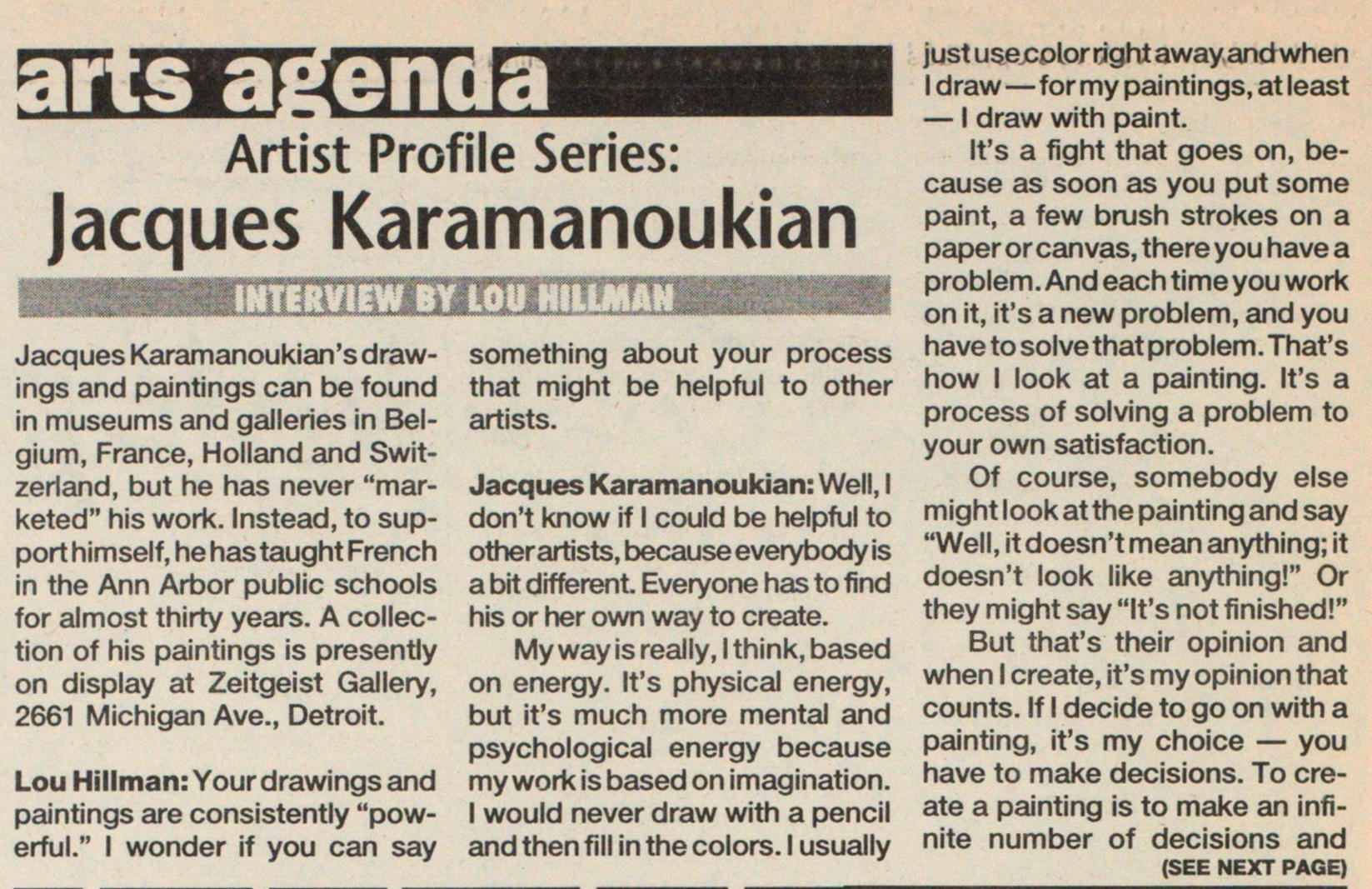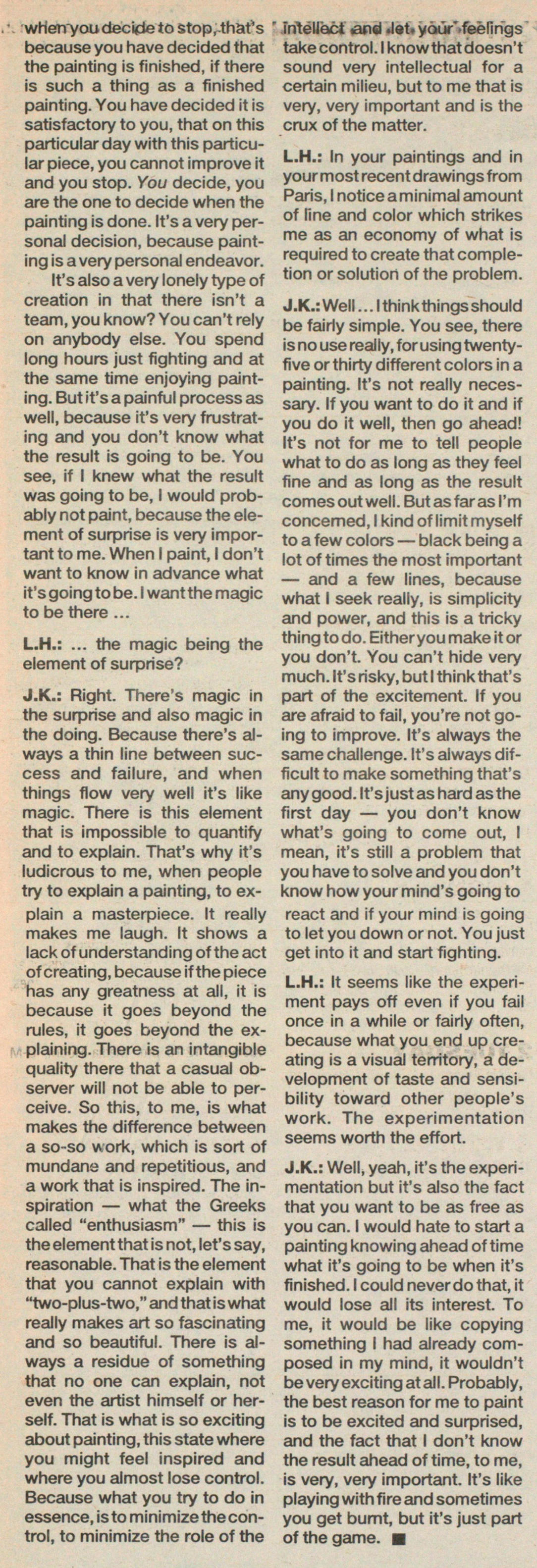Artist Profile Series: Jacques Karamanoukian


Jacques Karamanoukian's drawings and paintings can be found in museums and galleries in Belgium, France, Holland and Switzerland, but he has never "marketed" his work. Instead, to support himself, he has taught French in the Ann Arbor public schools for almost thirty years. A collection of his paintings is presently on display at Zeitgeist Gallery, 2661 Michigan Ave., Detroit.
Lou Hillman: Your drawings and paintings are consistently "powerful." I wonder if you can say something about your process that might be helpful to other artists. Jacques Karamanoukian: Well, I don't know if I could be helpful to other artists, because everybody is a bit different. Everyone has to find his or her own way to create.
My way is really, I think, based on energy. It's physical energy, but it's much more mental and psychological energy because my work is based on imagination. I would never draw with a pencil and then fiII in the colors. I usually just use color right away and when I draw - for my paintings, at least - I draw with paint.
It's a fight that goes on, because as soon as you put some paint, a few brush strokes on a paper or canvas, there you have a problem . And each time you work on it, it's a new problem, and you have to solve that problem. That's how I look at a painting. It's a process of solving a problem to your own satisfaction.
Of course, somebody else might look at the painting and say "Well, it doesn't mean anything; it doesn't look like anything!" Or they might say "It's not finished!"
But that's their opinion and when I create, it's my opinion that counts. If I decide to go on with a painting, it's my choice - you have to make decisions. To create a painting is to make an infinite number of decisions and when you decide to stop, that's because you have decided that the painting is finished, if there is such a thing as a finished painting. You have decided it is satisfactory to you, that on this particular day with this particular piece, you cannot improve it and you stop. You decide, you are the one to decide when the painting is done. It's a very personal decision, because painting is a very personal endeavor.
It's also a very lonely type of creation in that there isn't a team, you know? You can't rely on anybody else. You spend long hours just fighting and at the same time enjoying painting. But it's a painful process as well, because it's very frustrating and you don't know what the result is going to be. You see, if I knew what the result was going to be, I would probably not paint, because the element of surprise is very important to me. When I paint, I don't want to know in advance what it's going to be. I want the magic to be there ...
L.H.: ... the magic being the element of surprise? J.K.: Right. There's magic in the surprise and also magic in the doing. Because there's always a thin line between success and failure, and when things flow very well it's like magic. There is this element that is impossible to quantify and to explain. That's why it's ludicrous to me, when people try to explain a painting, to explain a masterpiece. It really makes me laugh. It shows a lack of understanding of the act of creating, because if the piece has any greatness at all, it is because it goes beyond the rules, it goes beyond the explaining. There is an intangible quality there that a casual observer will not be able to perceive. So this, to me, is what makes the difference between a so-so work, which is sort of mundane and repetitious, and a work that is inspired. The inspiration - what the Greeks called "enthusiasm" - this is the element that is not, let's say, reasonable. That is the element that you cannot explain with "two-plus-two," and that is what really makes art so fascinating and so beautiful. There is always a residue of something that no one can explain, not even the artist himself or herself. That is what is so exciting about painting, this state where you might feel inspired and where you almost lose control. Because what you try to do in essence, is to minimize the control, to minimize the role of the intellect and let your feelings take control. I know that doesn't sound very intellectual for a certain milieu, but to me that is very, very important and is the crux of the matter.
L.H.: In your paintings and in your most recent drawings from Paris, I notice a minimal amount of fine and color which strikes me as an economy of what is required to create that completion or solution of the problem. J.K.: Well ... I think things should be fairly simple. You see, there is no use really, for using twenty-five or thirty different colors in a painting. It's not really necessary. If you want to do it and if you do it well, then go ahead! It's not for me to tell people what to do as long as they feel fine and as long as the result comes out well. But as far as l'm concerned, I kind of limit myself to a few colors - black being a lot of times the most important - and a few lines, because what I seek really, is simplicity and power, and this is a tricky thing to do. Either you make it or you don't. You can't hide very much. It's risky, but I think that's part of the excitement. If you are afraid to fail, you're not going to improve. It's always the same challenge. It's always difficult to make something that's any good. It's just as hard as the first day - you don't know what's going to come out, I mean, it's still a problem that you have to solve and you don't know how your mind's going to react and if your mind is going to let you down or not. You just get into it and start fighting.
L.H.: It seems like the experiment pays off even if you fail once in a while or fairly often, because what you end up creating is a visual territory, a development of taste and sensibility toward other people's work. The experimentation seems worth the effort. J.K.: Well, yeah, it's the experimentation but it's also the fact that you want to be as free as you can. I would hate to start a painting knowing ahead of time what it's going to be when it's finished. I could never do that, it would lose all its interest. To me, it would be like copying something I had already composed in my mind, it wouldn't be very exciting at all. Probably, the best reason for me to paint is to be excited and surprised, and the fact that I don't know the result ahead of time, to me, is very, very important. It's like playing with fire and sometimes you get burnt, but it's just part of the game.